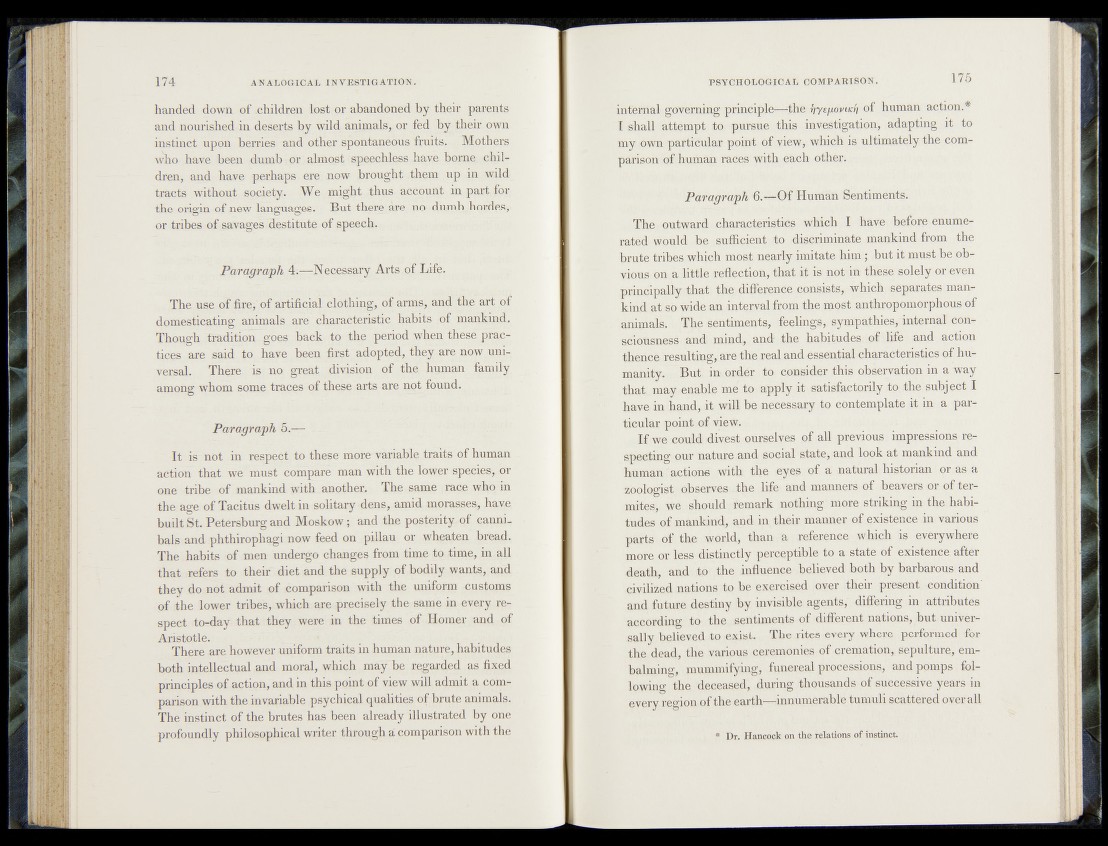
handed down of .children lost or abandoned by their parents
and nourished in deserts by wild animals, or fed by their own
instinet upon hemes and other spontaneous fruits.^ Mothers
who have been dumb , or almost speechless have borne, children,
and have perhaps ere now brought them up in wild
tracts without society. We might thus account in part for
the origin of new languages. But there are no dumb hordes,
or tribes of savages destitute of speech.
Paragraph 4.—Necessary Arts of Life.
The use of fire, of artificial clothing of arms, and the art of
domesticating animals arc characteristic habits of mankind.
Though tradition-goes back to the period when t^ ^ e j ^ c -
tices are said to have been first adopted, they are now universal.
There is no great division of the bijman faipify
among whom some traces of these arts are not found. D
Paragraph fcyBlI
I t iir nbt in respect to these more variable traits of human
actioiT that we must compare man with the lower s p e e ^ .o r
one tribe of mankind with another. The same saee who, m
theiage of Tacitus dwelt in solitary dens, amiJ
built St. Petersburg and Moskow; and the postenty-qf cannibals
and phthirophagi now feed on pillau or wheaten bread.
The habits of men undergo changes from time to time, in all
that refers to their diet and the supply of bodily wants, and
they do not admit of comparison with the uniform customs
of th e lower tribes, which are .precisely th e same in every respect
to-day that they were in the times of Homer and of
Aristotle. 4 '
There are however uniform traits in human nature, habitudes
both intellectual and moral, which may be regarded as fixed
principles of action, and in this point of view will admit a comparison
with the invariable psychical qualities of brute animals.
The instinct of the brutes has been already illustrated by one
profoundly philosophical writer through a comparison with the
internal governing principle—the jiyepoviicfi of human action.
I shall attempt to pursue this investigation, adapting it to
my own particular point of view, which is ultimately the comparison
of human raCes with each other.
Paragraph 6.—Of Human Sentiments.
The outward characteristics which I have before enumerated
wpijld -be sufficient to discriminate mankind from the
brute tribes which most nearly imitate h im ; but it must be chylous
on,a little reflection, that it is not’in these solely or even
principally that the difference consists, which separates man-
k ind at'so wide an interval from the most anthropomorphous of
animals. The sentiments,, feelings, sympathies,'internal consciousness
and mind,.and the habitudes of life and action
thence .resulting,.are the real,and essential characteristics of humanity.
But: imordOr to consider this observation in a way
that may enable Oje to apply it satisfactorily to: the/Subject I
have in hand, it will be mgsess.ary.to contemplate it in a particular
point of view.
If we could divest ourselves of all previous, impressions respecting
our nature,and social state, and lpok a t mankind and
human "actions with the eyes of a natural historian or as a
zoologist observes .the life and manners of beavers or of termites,.
we should remark nothing more , striking in the habitudes
of mankind, and in their manner of existence in various
parts of, the world, than m reference • which is everywhere
more or less distinctly perceptible to a state of existence, after
death, and itp. the influence believed both by barbarous and
civilized nations to he exercised over .their present condition
and future destiny by invisible agents, differing in attributes
according to the sentiments of different nations, but.univer-
sally believed to exist. Tbe,rites eyery where performed for
the dead, the various ceremonies of cremation,; sepulture, embalming,
mummifying, funereal processions, and pomps following
the, deceased, during thousands of successive years in
every region of the earth—innumerable tumuli scattered over all
Dr. Hancock on the relations of instinct